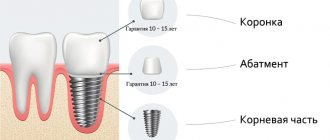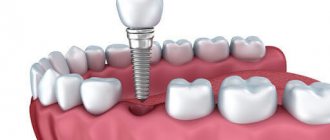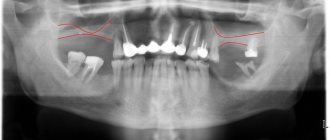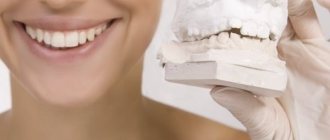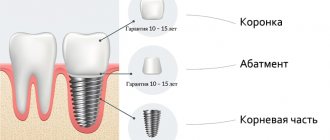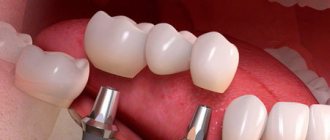The disadvantages of dental implantation, despite its increased popularity, can be very serious. If the procedure is performed poorly and not professionally, then it is difficult and sometimes impossible to correct the result. A foreign body in the form of an implant that is implanted into the gum poses a certain health hazard because it can provoke complications and cause unpleasant side effects.
Dental implantation is an expensive operation with a long postoperative period. This compounds her shortcomings. In cases where the implant does not take root or becomes loose, there is a possibility of having to perform the operation again, which leads to stress for the person; he is forced to undergo surgery again, wasting time and a lot of money.
Cons of implantation
In addition to the above, there are several more unpleasant consequences of an unsuccessful operation:
- Rejection of the installed structure due to violation of osseointegration for various reasons
- Rejection of the implant due to the fault of the patient who does not follow the doctor’s recommendations in the postoperative period - smoking, alcohol, lack or insufficient oral hygiene, excessive chewing load on the installed structure, ignoring regular visits to the doctor
- Ignoring on the part of the implantologist the presence of serious contraindications for implantation, as well as age restrictions
Complications after dental implantation in the lower jaw?
Complications after implantation of lower teeth are less common, since the procedure itself, according to doctors, is much simpler. However, there are some nuances here too. For example, if the walls of the mandibular canal are damaged, the lower lip and part of the chin can be deprived of sensitivity. Also, severe numbness of the oral cavity for 2 weeks or more (up to 6 months) can occur if the trigeminal nerve of the mandibular branch has been affected.
The appearance of severe bleeding indicates that the facial artery has been damaged.
EXPERT OPINION!
Most complications can be avoided at the preoperative stage. That is why the “Dr. Fedorov Implantation Center” pays due attention to it. We allocate enough time for examination, CT scan (on one of the most powerful and safest machines in the world), collection of tests, sanitation of the oral cavity and other procedures.
Thanks to this, our patients receive a carefully thought-out treatment plan, and subsequently new teeth that will serve them for decades.
Kozadaev Sergey Igorevich
Dentist, surgeon, implantologist.
Clinical experience 10 years.
Contraindications for implantation
Since dental implantation is a type of surgical operation, there are a number of contraindications and restrictions for its implementation. But doctors are not unanimous on this issue.
The level of development of modern medicine is growing. What used to be a major obstacle to the procedure is now being resolved thanks to new technologies and drugs.
There are absolute and relative contraindications for dental implantation. To the absolute, most experts consider:
- Malignant tumors
- Problems with blood clotting, blood diseases
- Allergy to anesthesia
- Alcoholism, drug addiction in chronic form
- Severe diseases of the nervous, endocrine, cardiovascular systems
- Kidney, liver failure
According to many experts, not all contraindications to implantation are insurmountable.
But, judging by medical articles and comments from modern dentists and implantologists, even such problems are not always an obstacle to implantation today. For example, bad habits will not prevent you from getting a normal smile and the ability to restore chewing function in full.
Under favorable conditions, implant installation is performed:
- To old people
- For heavy smokers
- After cancer treatment
- If during the development of type 2 diabetes the metabolic processes in bone tissue were not affected
- After a stroke or heart attack
- If you have a pacemaker
Important! The doctor is obliged to refuse implantation if the patient has seriously impaired tissue regeneration and in cases of diagnosing a severe, acute form of the disease or a chronic disease in a decompensated form (with frequent exacerbations).
But even in these cases there are options. A patient with ARVI who has a high fever, runny nose, cough and sore throat will first have to cure the disease. After all, in this state the immune system is weakened, a high-quality operation will not be possible, and serious complications and side effects are likely. And 10-14 days after treatment, he can already undergo full implantation.
Impaired tissue regeneration always means an almost 100% chance of implant rejection. An example is the unsatisfactory condition of tissues after radiation therapy in the maxillofacial area. They lose the ability to recover, renew and grow, so installing an implant is useless, it will not take root.
Signs of a problem
The postoperative period can be divided into several stages. Experts identify the following signs of complications during dental implantation after surgery:
- Pain of varying intensity. The patient may experience discomfort during implantation. The pain persists for several days after the pin is installed. The doctor prescribes painkillers. If the pain does not go away for a long time, this indicates the formation of an inflammatory process or nerve damage.
- Swelling. It is considered a common complication after the installation of artificial teeth. Appears as a result of soft tissue injury. To get rid of swelling, cold must be applied to the gum. If the swelling does not go away within 7 days, it may indicate tissue inflammation. In this case, the patient should consult a doctor.
- Bleeding. Slight bleeding at the site of implant installation is allowed, since vascular injury occurs during the operation. It should disappear after a few days. Patients with poor blood clotting may experience severe bleeding during dental procedures.
- Fever. It is a good reaction of the body to the implantation of a foreign body into the gum tissue. If the patient’s temperature does not drop below 37.7 degrees within a week, and swelling of the gums is also observed, this indicates an infection process and complications after implantation of the pin.
- Seam rupture. A complication often appears after installation of the structure. Possible causes are poorly placed sutures or mechanical damage during surgery. A common cause is inflammation at the suture site.
- Numbness. It is allowed within 6 hours after implantation. If sensitivity does not return for a long time, it means that the nerve endings were damaged during the operation.
- Inflammation of the gums on the upper or lower part of the jaw.
Pregnancy and implantation
Pregnancy is considered a relative contraindication for implantation. The installed implants themselves do not pose a threat to the health of the expectant mother and fetus. They do not contain substances that affect pregnancy and intrauterine development of the child. But the course of the operation includes several negative factors for the health of the pregnant woman:
- X-ray radiation - without pictures it is difficult to perform a full examination before the procedure, to check the quality of implant installation, therefore, in one form or another, such an examination is mandatory
- Medicines used during implantation
Important! X-ray radiation in relation to pregnant women is applicable only in emergency, urgent cases for diagnostic purposes. At other times it should be avoided.
It is better to postpone dental implant surgery during pregnancy
Any type of x-ray is unacceptable if the patient is pregnant. But since it is impossible to carry out implantation without radiography, the operation must be postponed until a more favorable time.
Most medications used during implant installation - analgesics, anesthetics, antihistamines, antibiotics, topical oral medications, sedatives - are contraindicated for pregnant women. Risking the health of an unborn child for such an operation is not permissible.
Is implantation really dangerous?
What are the dangers of dental implants? After their installation, complications often appear in the form of an inflammatory process in the soft tissues. The reasons may be:
- Infection due to non-compliance with hygiene requirements
- Unsatisfactory condition of bone tissue
- Functional (occlusal) overloads
- Soft tissue disorders
Factors influencing the development of inflammation are usually a violation of the sterility of the implant during installation, poor-quality, superficial oral hygiene in the postoperative period.
If sterility is not observed, the inflammatory process can affect the deep layers of bone tissue, and reimplantitis can occur - the implant sinking deeper into the skull bone. To avoid such problems, the dentist often installs the structure at a certain angle.
In this case, in the case of increased load on the implant, a piece of the jaw bone in the area of the tooth socket may break off.
Today, neither the highly qualified doctor nor the modern equipment used is a guarantee of the success of the implantation operation.
The procedure for augmenting bone tissue requires a highly qualified doctor and strict compliance with all requirements in accordance with the protocol for conducting a surgical operation. But even with the most favorable course of implantation and the highly qualified doctor, every twentieth implant, according to statistics, still does not take root.
COMPLICATIONS DURING IMPLANTATION
Article navigation
- Complications during implant installation
- Complications some time after installation
- Risks with immediate and delayed loading
- Causes of complications
- How to avoid problems?
Question for a specialist
Many patients believe that dental implantation is invariably associated with some cardinal changes in the body - bleeding, acute pain, the need for regular visits to the doctor, mobility, displacement of the implant and much, much more. But all these are complications after implantation. They really do exist, but it is worth noting that they are not as common as many imagine. In addition, in practice it has been proven that implants are rejected no more often than in 1-2% of all cases. If you follow all the doctor’s recommendations and select a professional implantologist to work with, then you will not have the opportunity to get acquainted with the complications personally. But you still need to know about them.
The possible consequences of dental implantation can be divided into two temporary directions: complications during installation and the rehabilitation period (on average up to six months), as well as the consequences that the patient faces after the implant has taken root - that is, after 2-3-5 or even 10 years.
Simpl Swiss implant (Switzerland) + metal-ceramic crown = 35,000 rub.
All manipulations are included, treatment guaranteed!
Save RUB 15,000. for implantation >> Free consultation with an implantologist +7 (495) 215-52-31 or write to us
Complications that may occur during implant installation
When considering unpleasant situations that may arise after dental implantation, it is necessary to separate two concepts - “complications” and “consequences”. The consequences are the result of tissue injury. They occur almost always and are nothing serious. Complications are more serious and completely undesirable consequences that need to be addressed promptly.
So, the norm after surgery is considered to be slight bleeding (during the first 24 hours, relieved with cold compresses on the side of the cheek), pain caused by tissue injury or overheating due to the operation of the drill when creating a cavity for the implant in the bone - the consequence is eliminated by taking painkillers, increase in body temperature up to 38-39 degrees on the first day after surgery.
As for complications during implant installation, they can be as follows:
- damage to the nerves of the lower jaw: leads to numbness of parts of the mouth or face - goes away on its own after a few weeks or months,
- damage to the maxillary sinuses: when fixing an implant on the upper jaw, the doctor may not calculate the length of the structure, which during installation will lead to damage to the shell of the maxillary sinus. During the operation, you will have to quickly stitch it up, but among the main consequences of this problem are the occurrence of a runny nose, sinusitis, or even meningitis.
Complications after dental implantation
The complications listed below arise after implants are implanted into the bone. Moreover, they can occur either a couple of weeks after the operation or several months or even years later.
- bleeding: if the bleeding cannot be stopped within 24 hours, you should contact your doctor - this may be a sign of more serious complications,
- dehiscence of the applied sutures: only a repeat operation to apply them is required,
- pushing the implant into the sinus of the upper jaw: occurs when there is strong pressure on the implant after its installation, insufficient primary fixation or weak bone. In this case, the implant is removed, the sinus is restored (stitches are placed), and drug treatment is performed. After complete recovery of the body and if there is enough bone tissue, a second attempt at implantation is possible,
- an increase in body temperature that persists on the second day after surgery (above 38 degrees) - this may be a sign of the development of a serious inflammatory process,
- loss or rejection of the implant: occurs due to insufficient fixation, weak bone or the inability of the body to accept a new foreign body at the moment. The patient should remember that implant rejection can occur even many years after its installation - for example, due to poor oral hygiene or exacerbation of chronic diseases of the body,
- peri-implantitis: inflammation of the periodontal tissues - that is, the bone itself in which the implant is fixed. To solve the problem, measures to restore the bone are promptly applied, otherwise the implant is removed,
- impossibility of installing prostheses: this problem, alas, is also not uncommon and it arises due to the unprofessionalism of the implantologist - he simply did not calculate the correct location of the implants and it will not be possible to load them with a prosthesis (of course, it is possible to install crowns, but they will not be very comfortable, will put improper pressure on the bone and their appearance will leave much to be desired). In this situation, the orthopedic doctor will have to “get out”, who will subsequently deal with prosthetics on the installed implants.
Risks of immediate and delayed loading of prostheses
Complications after implantation occur with the same frequency in both delayed and immediate loading techniques and do not depend on the method of implant placement. However, it is worth considering that for each implantation method there must be certain conditions. For example, it is better to refuse immediate loading, when dentures are immediately installed on implants, if there is too little bone tissue along the length of the upper jaw (including the deep basal region - it is much thinner in the upper jaw than in the lower jaw). Careless stress from chewing food will increase the risk of damaging the maxillary sinus and pushing the implant inside it. In this situation, it is better to prefer the method with delayed loading and sinus lift.
But with periodontal disease and periodontitis, on the contrary, the risk of developing complications is much less when choosing a method with an immediate load, since the implants are fixed not in the central part of the bone, but in the deepest part - the basal part. It does not undergo atrophy, is more durable and sterile, which allows implants to be securely fixed even in the presence of inflammatory processes.
Causes of complications after dental implantation
- unprofessional operation: incorrectly chosen size of the implant, place for its installation, infection inside the wound, lack of experience on the part of the attending physician,
- the presence of an undetected disease of the body, which, when exacerbated, led to complications or rejection of the implant (this is why it is so important for the patient to tell his doctor about all the problems, it is also advisable to visit a therapist before implantation and undergo a series of tests),
- failure by the patient to comply with all recommendations of his doctor both at the stage of preparation for surgery and during the rehabilitation period: according to research results, this is the most common cause of complications.
Complications after dental implantation – how to avoid?
Avoiding complications after implantation is quite simple: you need to choose a professional doctor who has experience in performing operations with good outcomes, carry out preparatory work - identify possible contraindications, and carefully treat your teeth and gums. In addition, a clinic suitable for dental implantation, having sterile operating rooms, disposable and thoroughly disinfected instruments, and equipped with modern treatment equipment is also important. It is also necessary to choose a high-quality implant, created in a well-known, not underground company.
The patient himself should not forget the recommendations of his doctor - before the operation, eliminate bad habits, carefully monitor oral hygiene, after the operation - also give up smoking and alcohol, do not lose sight of daily oral care procedures and avoid consuming too harsh products that may damage or dislodge the implant. Don’t forget about regular preventive examinations with your doctor - this will help maintain your warranty and promptly identify emerging problems.
Dangers during implantation
Any surgical intervention carries a certain risk for the patient and even for an experienced doctor.
Implantation as an operation is no exception. There are several types of risks associated with its implementation:
- Incorrect choice of procedure technique
- Incorrect selection of implant, its shape, size
- Errors during preparatory procedures
- Poor quality bone growth
- Placing the implant at the wrong angle
- Risk of possible damage to the facial nerve
- Intolerance by the patient to a certain or any type of local anesthesia, detected already during surgery
Such medical errors lead to negative consequences both during and after dental implantation. In addition, everyone experiences the stress associated with surgery differently, and the body's reaction can be unpredictable.
Implantation: arguments AGAINST
Despite the fact that implantation has a number of significant advantages compared to traditional prosthetics, several negative arguments can be made:
- longer treatment – can last for years,
- a large number of contraindications,
- surgery is required
- the degree of implant fixation directly depends on the patient’s health status and the quality of oral care,
- long postoperative period - rehabilitation can take about 2 weeks, swelling and complications are possible,
- maximum professionalism of the doctor is required,
- high cost of the service.
Thus, dental implantation is truly a progressive and most functional method of restoring lost teeth. Of course, there are certain risks. But if you are careful, choose a trusted clinic and a professional implant surgeon, all possible unpleasant consequences and complications simply will not arise, and the new tooth will last for decades.
Video review from a patient about teeth restoration using a fixed denture
Possible complications in the postoperative period
In the postoperative period, the following complications may occur:
- Impaired osseointegration, which can result in gradual loosening of the implant under load, even if it has taken root normally. The reason is an incorrectly calculated or executed installation angle of the structure.
- If there is a gap between the abutment and the gum, then as a result of the accumulation of food particles in the subgingival space, an inflammatory process is possible
- If there is insufficient bone tissue in the upper jaw, an implant protruding into the maxillary sinus can cause sinusitis
